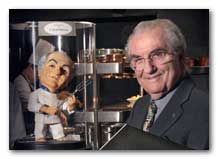|
Gualtiero Marchesi, the Master of Italian Cooking,
seeks to restore the word “cook”, a word that
represents a profession, and that merits being used
with care and respect.

Gualtiero Marchesi
The Master of Italian
Cooking, previews, for Expo Milano 2015, his Ten
Commandments of Cooking:
1. Cooking is a craft or
better still, a service. It’s a ministerium.
2. The white uniform
possesses the essential characteristics of its
function: honesty, cleanliness, and respect.
3. The cook’s law is the
recipe that he or she is executing, bearing in mind
that every good execution implies a certain amount
of interpretation, finely calibrated, neither too
much or too little, introduced with reverent
discretion. One step up, comes the “composer".
4. Depending on a cook’s
degree of knowledge and experience, he or she is one
of three possible types: the executor, the
interpreter, and the composer. To reach this level,
a cook must first master the technique, and then
gain experience in all the relevant areas:
appetizers, first courses, meat, fish, and pastry,
even if they then decide to specialize in just one.
5. Contributing greatly
to the cook’s experience is a knowledge of place:
the water, the soil, the air that conserve a memory
of that place, conferring substance and taste to its
fruits and animals, as well as an acquaintance with
inhabitants and climate, with which both must
inevitably interact.
6. The study of other
countries’ food cultures can help a cook broaden his
or her knowledge of the culinary arts, and the
approach to recipes, conjuring a different
appearance and employing different ingredients.
7. A cook’s skill rests
on two pillars: knowledge of raw materials, and how
to handle them, respecting their nature.
8. Technical solutions
and virtuosity are only possible in the context of
knowledge of technique and raw materials, both in
the conception and in the execution phases.
Technique means the appropriate, controlled, and
non-destructive use of the most suitable utensils
for the task in hand, without destroying the raw
materials in question.
9. For each dish, the
cook must know precisely what to do: cooking times,
and methods, the exact temperature and, where
necessary, the resting periods, since these are also
important, much like a pause or a silence in music.
Final presentation depends largely on the choice of
the most suitable serving dish.
10. One of the tasks
that does credit to a good cook, is spreading and
increasing knowledge and awareness of the culture of
good food. He or she can do this by teaching good
eating habits via the food that is served, as well
as by training the young recruits, and handing over
the reins to those who deserve it, introducing them
to the culture of food which, in its finest
manifestation, is a truly conscious experience, as
well as being a striving for constant improvement,
that is then adapted to a real-world context.
And finally, a reminder:
Creating is not copying. Which doesn’t mean a
pursuit of the new or the "never seen before" for
its own sake. We can find innovation in the known
just as easily as in the unknown. The key is that it
achieves the truth.
Truth in motion becomes
art.
For more information
Gualtiero Marchesi
EXPO MILANO 2015
Marco Dal Negro |